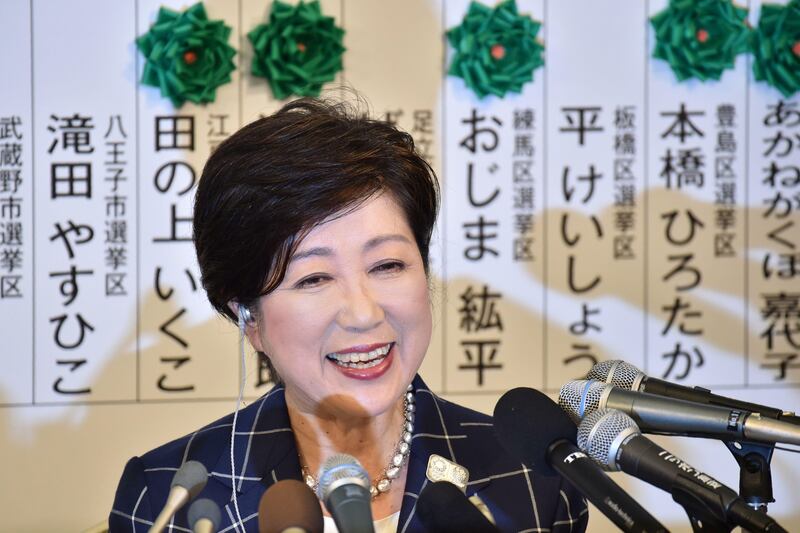Japanese prime minister Shinzo Abe’s party suffered a heavy defeat at the hands of an upstart outfit in elections for Tokyo’s assembly, an exit poll and survey by public broadcaster NHK showed.
Tokyo governor Yuriko Koike’s Tomin First (Tokyo Residents First) party was projected to win 48-50 seats in the 127-seat assembly, compared with 13-39 for Mr Abe’s Liberal Democratic Party.
That could end up being the LDP's poorest electoral performance in the capital. With the Komeito party - with which Ms Koike teamed up for the election - forecast to get 21-23 seats, the popular governor is set to gain a majority.
"People appreciated the results we have achieved by taking the point of view of Tokyo residents," Ms Koike said after the results started to come out. "I think this is an opportunity to make the Tokyo assembly what it should be."
Going into the election Ms Koike’s party had only six seats in the assembly, compared with 57 for the LDP, according to the assembly’s office.
A spate of scandals has eroded support for Mr Abe, and Sunday’s loss in Tokyo may stir criticism within his party, where rivals are positioning themselves to end his run as Japan’s third-longest serving premier since the Second World War. It could also hurt the party’s chances in a national election due next year. In 2009, a big loss for the LDP in Tokyo preceded a landslide general election defeat months later.
Ms Koike, who defected from the ruling party last month, has campaigned on a platform of open government, and cutting wasteful spending in the city of 13.7 million, which accounts for about a fifth of Japan’s economy. The LDP had sought to portray her as indecisive for delaying the relocation of the iconic Tsukiji fish market over pollution concerns and insisting on reviewing the ballooning cost of the 2020 Olympics.
Mr Abe, 62, has suffered a series of gaffes by his ministers and allegations of cronyism over government support given to a school run by a friend. More popular colleagues such as Shinjiro Koizumi, the 36-year-old son of a former premier, took a prominent role in the Tokyo campaign.
Hakubun Shimomura, head of the LDP’s Tokyo chapter, said that national politics led to the result. Mr Abe met for dinner with party heavyweights including finance minister Taro Aso and chief cabinet secretary Yoshihide Suga after the election, and LDP executives are set to hold an extraordinary meeting on Monday morning.
Ms Koike, 64, is a former television journalist fluent in English and Arabic who has served as environment minister and defence minister, as well as an LDP executive. A big win would give her momentum to take her more populist message to the national stage.
In the 2009 Tokyo poll, the LDP and its coalition partner Komeito lost their dominant position in the assembly - months before a resounding defeat to the Democratic Party of Japan in a general election that led to more than three years in opposition. This time, however, Mr Abe doesn’t have to call a vote until December 2018, a few months after the LDP is due for a formal leadership election.
* Bloomberg





